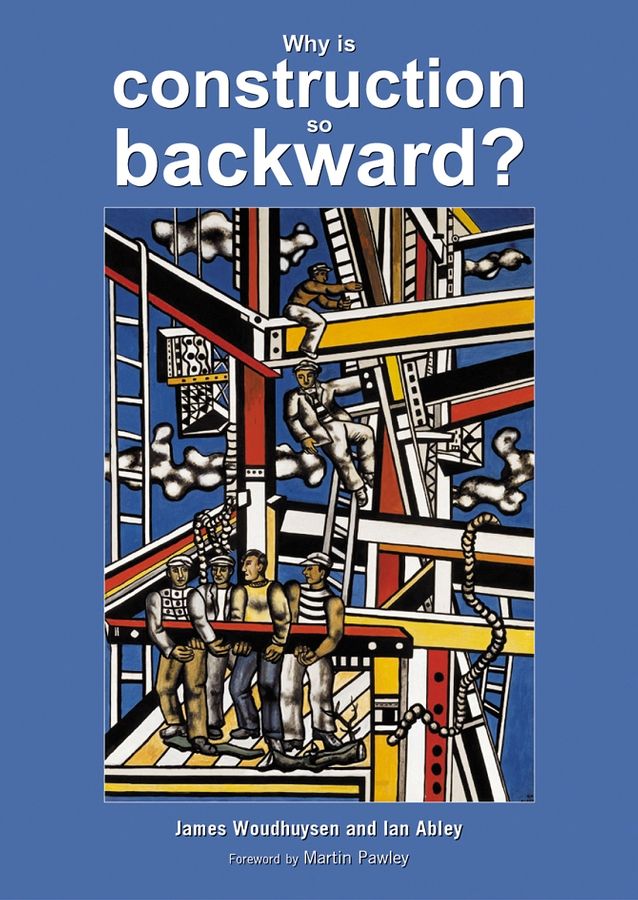Construction is vital both to Gross Domestic Product and to today’s politics. Prime Minister Tony Blair himself chairs a cabinet committee on the Thames Gateway development, to the east of London. Housing has proved a big factor in Chancellor Gordon Brown’s worries about the Euro. But the construction sector is one of the world’s weakest in innovation. Deputy Prime Minister John Prescott’s target of just 4000 homes to be made through prefabrication shows how building remains a 19th century affair, not a 21st century one. <p>Drawing on the latest technologies that have emerged both inside and outside the sector, <i>Why is construction so backward?</i> forms a detailed, practical alternative to the conventional wisdom in building design and urban planning. It is a powerful call for reform, and a sharp polemic against architecture as social engineering and environmentalist dogma.</p> <ul> <li>Contains a foreword by Martin Pawley</li> <li>Includes contributions from such high profile figures as Stefan Muthesius and Miles Glendinning</li> </ul> <p>Praise for <i>Why is construction so backward?</i>:</p> <p>‘<i>Very compelling… a significant piece of research and thought leadership. Essential</i>.’ <b>Colin Bartle-Tubbs, UK Operations Director, Deloitte</b></p> <p>‘<i>Welcome and timely… takes on an industry that has revelled in complacency for too long</i>.’ <b>Bernhard Blauel, Principal, Blauel Architects</b></p> <p>‘<i>The authors are prepared to be daring, reframe the question and posit new paradigms. Reflecting effortlessly across the literature of property, business, market research and construction, the book’s kaleidoscope of ideas, examples and images gives it a refreshing depth of insight and breadth of vision</i>.’ <b>John Worthington, Founder, DEGW</b></p> <p>‘<i>A tour de force of polemical provocation. This timely work forces one to think about construction in the broadest terms. Required reading.</i>’ <b>Paul Finch, Editorial Director, EMAP Construct</b></p> <p>‘<i>A must-read for architecture students and also important for practitioners, this is a passionate critique of the construction industry and the planning process, and brings new depth to debate about the relationship between architecture and society</i>.’ <b>Penny Lewis, Editor, <i>Prospect</i></b></p> <p>‘<i>Shock therapy for construction policymakers</i>.’ <b>Austin Williams, Technical Editor, <i>The Architects’ Journal</i></b></p> <p>‘<i>The introspection of architects, planners and politicians involved in urban, housing and planning issues needs a little turmoil, perhaps. The book is persuasive, at times heavily prescriptive, and certainly argumentative – but it may catalyse a wider and more informed debate on the future of UK housing policy</i>.’ <b>Michael Hulme, Director, International Centre for the Study of Media, Technology and Culture, Henley Management College</b></p> <p> ‘<i>The pleasure of this book is not only that it takes apart, with great gusto, the all-pervasive environmental prejudices of our time, but that it does so with such detailed scrutiny of construction and with such passion to build more and better.</i>’ <b>Alan Hudson, Director of Studies in Social and Political Science, Oxford University Department for Continuing Education</b></p> <p>‘<i>Important not just for architecture and design, but also for marketing – especially given how the corporate world uses different design elements, such as buildings, to build brands</i>.’ <b>Lisbeth Svengren and Mats Frick, Stockholm University School of Business, Sweden</b></p>
Architecture
Why is construction so backward?
₹4,535.00
This book is currently not in stock. You are pre-ordering this book.

